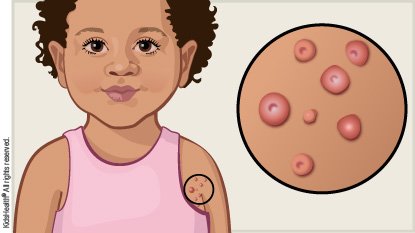Molluscum Contagiosum: How to Care for Your Child
Molluscum contagiosum is a skin rash caused by a virus. The rash has clear or flesh-colored bumps that often have small dents in them. It usually goes away without treatment in 6–12 months, but sometimes can take longer.


-
Your child should keep the skin clean and moisturized.
-
Remind your child not to touch, scratch, or rub the bumps.
-
Give your child any medicines as directed.
To prevent spread of the virus:
-
Have your child wash their hands well and often.
-
Cover the bumps with clothing or a bandage for school.
-
Cover the bumps with a watertight bandage before your child swims or does activities with close contact (like wrestling) or shared equipment (like gymnastics).
-
Don't let your child share towels or pool toys.
-
Your child shouldn't shave over areas that have bumps.

-
Your child has swelling, pain, or severe itching around the bumps.
-
The bumps look hot, red, or painful, or begin oozing.


Is molluscum contagiosum contagious? Yes. It can spread to other parts of the body or to other people through skin-to-skin contact (including sexual contact) or contact with an infected person's bath towels or clothes. A child with molluscum contagiosum does not need to stay home from child care or school.
What can happen with molluscum contagiosum? The rash doesn't usually cause any long-term problems. The bumps usually are painless, but might get itchy, sore, red, and/or swollen. If scratched or picked, they can get infected with bacteria. If that happens, a child needs antibiotic treatment.
How is molluscum contagiosum treated? In many cases, molluscum contagiosum does not need treatment. If the rash continues to be very itchy, spreads too much, or gets infected, health care providers may decide to treat it. Infections in the genital area need treatment to prevent the infection from spreading to sexual partners. Treatment may include applying chemicals to the bumps, or freezing or scraping the bumps.